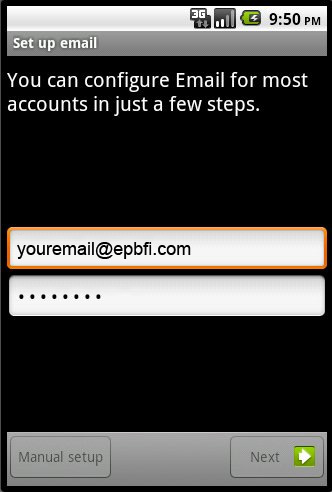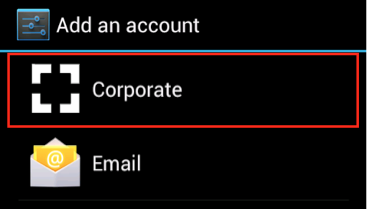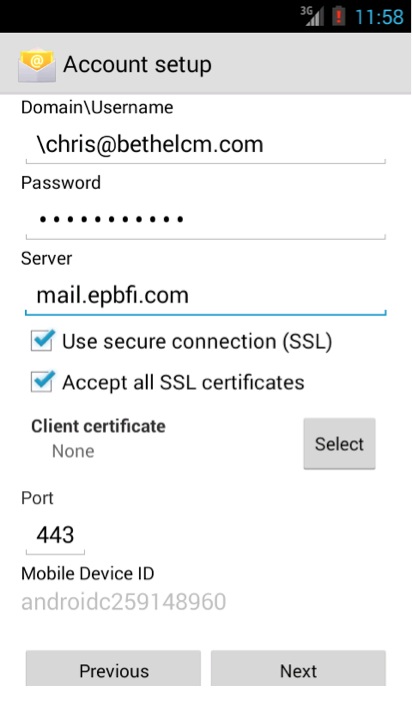

- #EPBFI EMAIL SETTINGS FOR ANDROID HOW TO#
- #EPBFI EMAIL SETTINGS FOR ANDROID ZIP#
- #EPBFI EMAIL SETTINGS FOR ANDROID TV#
#EPBFI EMAIL SETTINGS FOR ANDROID TV#
Once the first EPB employee set our TV up, a second person came to our door and worked on our fiber optics on the outside of our house. Chattanooga's pioneering smart grid doesn't answer all the questions or solve all the issues raised by cars with long charging times and short range, but it's a huge help.A few months back we upgraded EPB services from using a set top box to using their “EPB Fi TV” app through a fire stick, and apparently my dad also paid for 300 Mbps internet.
#EPBFI EMAIL SETTINGS FOR ANDROID HOW TO#
These are indeed the kinds of questions we need to ask - they're right up there with figuring out how to recharge cars owned by urban apartment dwellers. Keel said, "We're asking questions like, 'How do we recover our money from people who recharge at our stations?' And, 'If we put chargers at gas stations, how do we get around the fact that the owners of those stations can't sell electric power?'" We'll definitely have a station at our downtown building, and we want them where people work and play, and at shopping centers."Īccording to Keel, EPB is working with the industry-supported Electric Power Research Institute (EPRI) on a study that should give useful information about how adding EVs to the distribution network will affect the grid. "We're gathering input from the community, working with the mayor's green team. "People will be able to monitor the electricity use of their toasters if they want," Bailey said.ĮPB's Diana Bullock said that work on where the 300 electric charging stations will go is underway and ahead of schedule.

But they'll soon be deployed at a rate of 1,500 per week. "Right now we take in two million data points per year, but by the fall of 2012 it will be six billion data points annually." There are 7,000 smart meters (which give consumers unprecedented information and allow utilities to check the current flow from HQ without meter readers) installed in Chattanooga now. "Smart meters will allow us to collect incredible amounts of data," said Bailey. So if all 2,000 consumers plugged in electric cars simultaneously today, the system would flash red danger lights but there'd be no way of knowing what had caused the problem. But it currently can't see beyond that and track electric load in the homes themselves. Most utilities today have no idea how much electricity individual customers are using, and finding the source of blackouts involves not looking at a computer screen but sending out search parties - what EPB calls "truck rolls." Ryan Keel, an EPB assistant vice president of electric systems with a specialty in the smart grid, said that his company is better than most utilities in actually being able to monitor the health of its 115 substations (each serving 2,000 customers). The sad truth is that most are talking, talking, talking about the smart grid (it makes great headlines), without a fast-track plan that will have one in place for the EVs rolling out late this year and early next. Unfortunately, few other utilities around the country are as advanced. They can even use some of the energy stored in the EVs' batteries to add electricity back into the system.

If a plant operator sees a brownout coming on a hot day, they can, with their owners' consent pull some charging EVs off the grid, deferring them until the evening hours.

The smart grid addresses this by allowing interactivity between owners, cars, and utilities too. The problem is compounded if everyone plugs in at the same time (at say, 6 p.m.
#EPBFI EMAIL SETTINGS FOR ANDROID ZIP#
And EV ownership is likely to be concentrated in certain upscale zip codes (they're expensive), which raises the possibility of overloaded transformers in some neighborhoods while others are barely touched. Plugging in an EV is like adding a new house to the grid, utilities say. EPB will have synergy between EVs and its smart grid, but most other places probably won't. That's why a visit to EPB, the municipal utility for Chattanooga, Tenn., - which gets its power from the Tennessee Valley Authority - was both disturbing and enlightening. Indeed, for a number of reasons it's hard to imagine EVs having a smooth landing on the roads of America with the clueless and dumb power grid we have today. Whenever utilities talk about charging electric cars, they invariably invoke the smart grid as an essential ally in their case.


 0 kommentar(er)
0 kommentar(er)
